by Mayumi-H | Jun 1, 2017 | It's My Life
This post was inspired by Kourtney Heintz’s list of the Best 100 Novels, a challenge initiated by Nathan Bransford, on his own blog.
I’ve been in need of a fun activity, just to get my head into a healthier place than it’s been over the last several weeks. Sure, I wrote a story based on Dmitry Glukhovsky’s Metro 2033 novels, because I enjoyed them so much, and that was certainly fun; and, I’ve been getting back into the rewrites of my own sci-fi adventure story. But some of the latest disheartening events on the global stage had really been wearing me down. At those times, I can take some refuge in my own creativity, but it’s even more comforting to bask in the light of others’ creativity, especially when those others have inspired, enlightened, or simply just entertained me.
Kourtney stuck to the hard rules of this challenge, which I’m sure was hard. I took an easier route, because I wanted this to be fun, not an assignment.
Now, I’ve read hundreds of novels over the years…but I knew any “Best” list would have some classics which everybody knows: Don Quixote, Sense and Sensibility, To Kill a Mockingbird, 1984, yadda yadda. Those are definitely great books, mind you, but I wanted to do something a bit different, here.
For my version of the challenge, I looked at only those books I’ve read in the last ten years or less. This would disqualify any book I read only for a class and vowed never to pick up again (such as On the Road or Catcher in the Rye; don’t get me started), while still offering some insight into how my reading tastes have changed over the years. As it turned out, not a whole lot.
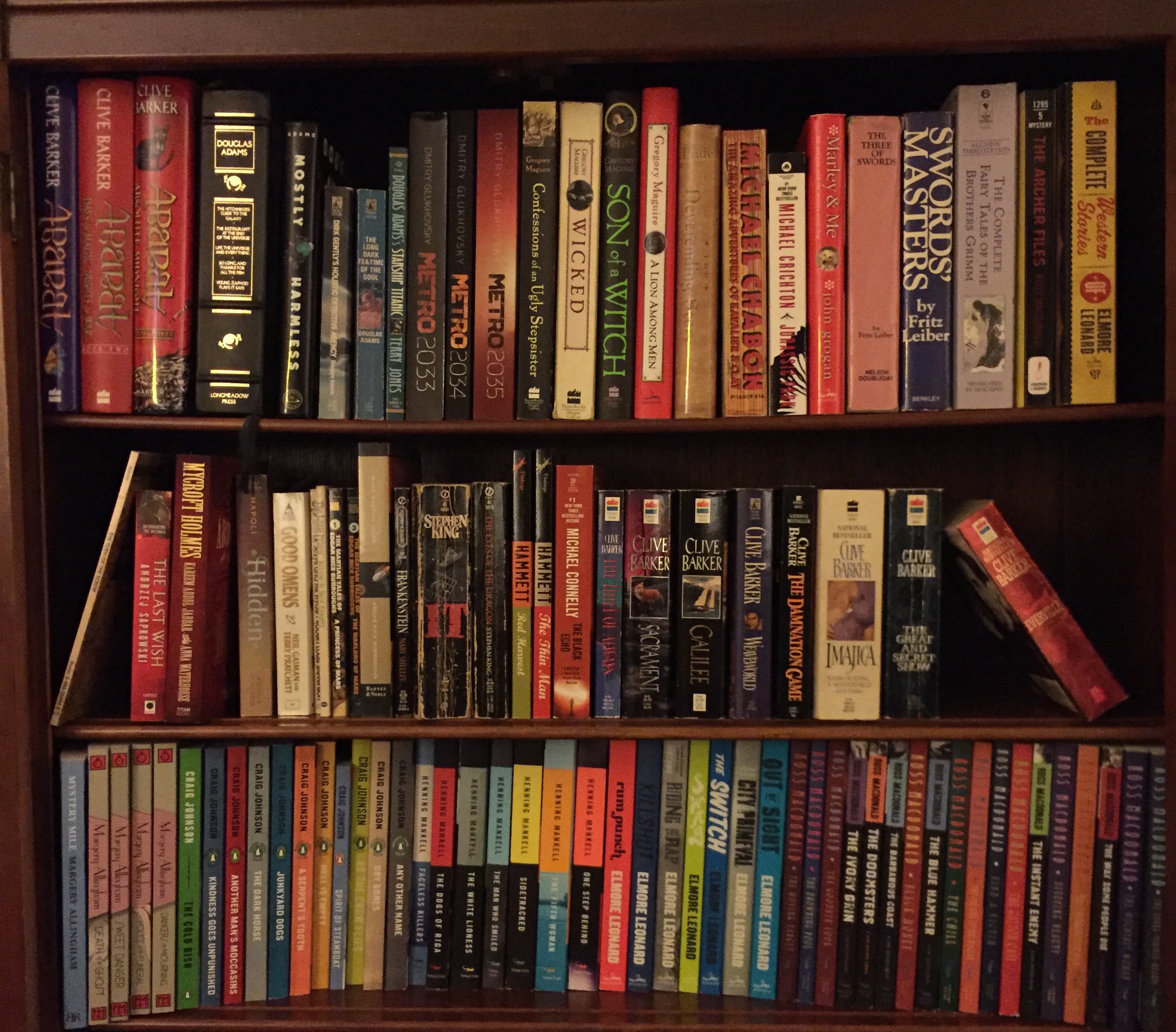
My 100 Best – or, rather, Favorite – Books of the last 10 years
As for ranking, I would list them as:
- Ross Macdonald (18)
- Elmore Leonard (8)
- Douglas Adams (9)
- Craig Johnson (11…and counting; there’s a new one I haven’t gotten, yet)
- Edgar Rice Burroughs (4 – specifically, his John Carter of Mars books)
…with the rest of them falling into an ever-shifting heap, where, on any given day, Barker might leapfrog Allingham to take Maguire’s position while Glukhovsky choke-holds Sapkowski for a higher slot, and Mankell sits back to watch.
I admit: I cheated. Still, it was a fun diversion for an hour or so, to look at my favorite books over the last 10 years. As a side note, that third shelf represents most of my reading material from the last 3 years, minus the Glukhovsky, Hammett, Sapkowski, and Abdul-Jabbar.
A few interesting points about this group:
- I was never much of a Stephen King fan growing up – he was too much horror for my sci-fi favors – but on a cross-country trip, I found a tattered copy of IT sitting on my cousin’s Venice Beach bookshelf. In search of something to read one night during my California sojourn, I asked if she wouldn’t mind me borrowing it. She said, sure; she couldn’t even remember whose it was or how it got there. I read it on the entire flight back to New York and barely put it down for the next week until I’d finished it.
- Clive Barker’s The Thief of Always has remained on my annual re-read list for the better part of 20 years. It’s a much shorter novel than his others, and it’s written for a younger audience than his usual fare, but it has such charm and magic, it will probably forever remain my favorite from his pen.
- After finishing Elmore Leonard’s Killshot, I started a new book…then stopped, picked up Killshot again, and read it through a second time.
- Ross Macdonald. Many folks praise Chandler and Hammett for their contributions to the genre, but if you like crime stories – especially noir crime stories – and you have not yet read Ross Macdonald, correct that.
I hope Kourtney doesn’t take too much offense that I changed the nature of this challenge to suit my own parameters. Wuthering Heights is a beautiful novel, and it should be on this list…but I haven’t read it in at least a decade. ;)
Were you offended by my version of the challenge? If you were to put together your 100 Best Novels list, how do you think you’d do it? What would definitely be on your list?
by Mayumi-H | May 2, 2017 | It's My Life
The story
Metro 2033 (Метро 2033) tells the story of the 40,000 survivors who escaped to the subway tunnels of the Metro beneath Moscow when nuclear conflict escalated to war between Russia and the United States in 2018. For the survivors, life went on, in a fashion. Precious ammunition counts as currency in the Metro, where people live day-to-day cultivating mushrooms, tending to pigs, and defending their home stations from mutated creatures and hostile invaders from other stations on the line. Now, a new threat has arrived: Dark Ones – neither creature nor man but some strange psychic being in-between – have started to encroach on VDNKh Station. Artyom, who was only five years old when the missiles struck, and who remembers the surface world only as a vague dream, is entrusted with a dangerous mission to destroy the Dark Ones. But that means leaving VDNKh, making his way through the warring factions of the Metro, and confronting the horrors on the surface. Along the way, he will discover a secret about the Dark Ones that could change the course of humanity forever.
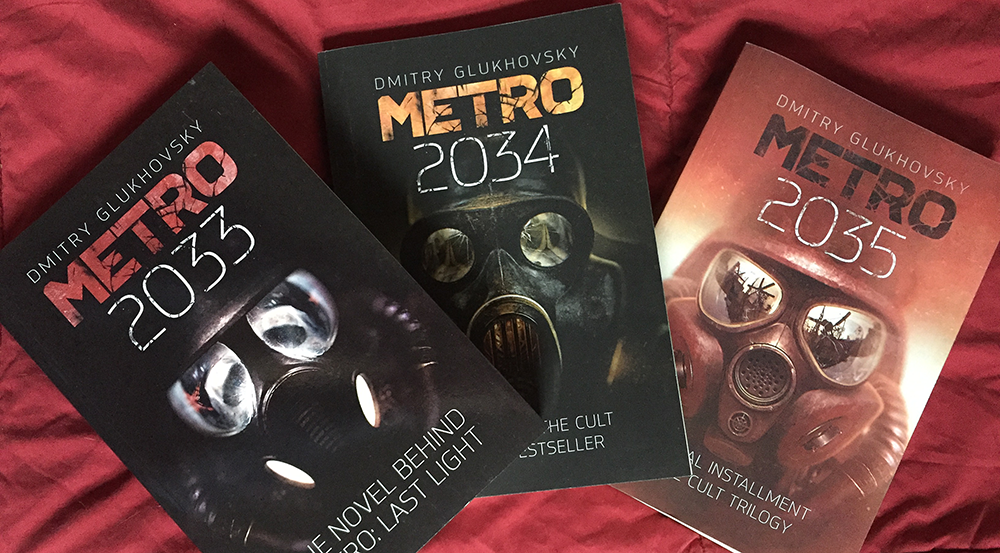
My ‘Metro 2033’ collection of novels.
First published online by young Russian writer Dmitry Glukhovsky in 2002, Metro 2033 was followed by Metro 2034 in 2009, and Metro 2035 in 2015. A videogame adaptation of the first book came in 2010 from developer 4A Games, which, admittedly, was my introduction to the series, with a follow-up sequel in 2013. [If you are only familiar with the game/s, but you liked the world presented there, and if you’re dedicated enough to make it through some dense Russian fiction, I recommend the books.]
While the author was born and the books themselves take place well after the Cold War, all three include critical – at times even damning – observations on communism and fascism. These two ideologies are on display throughout the books as the primary warring factions, the Reds and the Fourth Reich. A third group, Hansa, is a free trade coalition, while the sub-stations that comprise Polis at the center of the Metro map represent a kind of intellectual oligarchy. Artyom’s interactions with all of these small nation-states (nation-stations?) form the backdrop of the Metro’s bleak survivalist landscape.
My feelings
I’ve just finished reading the third book, but I could almost go back and re-read all three of them again right away. Not because they’re great masterpieces, but because I simply felt for this story, both on the page and beyond it. I’ve seen a lot of frightening similarities to the “old Moscow” told in these books to the current world in which we live, and I hope we don’t make the same mistakes the killers and the survivors in these books do.
The first book is definitely a freshman work; Glukhovsky wrote it when he was only eighteen. The reader – especially a non-Russian-reading one – will feel the lack of a professional editor. The text is also incredibly dense, with long passages of history and exposition. But, the world and the characters of the Metro are so damn compelling, and the situation so close to the reality we’re experiencing today, that I was willing to forgive the writerly missteps, and just enjoyed being swept along Artyom’s journey through this speculative-future-Moscow and its subterranean tunnels. The second book (Metro 2034) is more polished, with fewer characters and tighter story arcs; the third (Metro 2035) even more so. There’s something about that first book, though, that really spoke to me. The characters feel like people one could actually meet in this bleak, nihilistic situation. Each man (the cast is overwhelmingly dominated by men) has his own story. Some of them, like the Marxist Revolutionaries, we glimpse only for a few pages; others, like the young Brahmin who befriends Artyom in the sprawling Library station, we grow to care about. They all have their own goals, fears, and conflicts, and create a greater world with their individual stories.
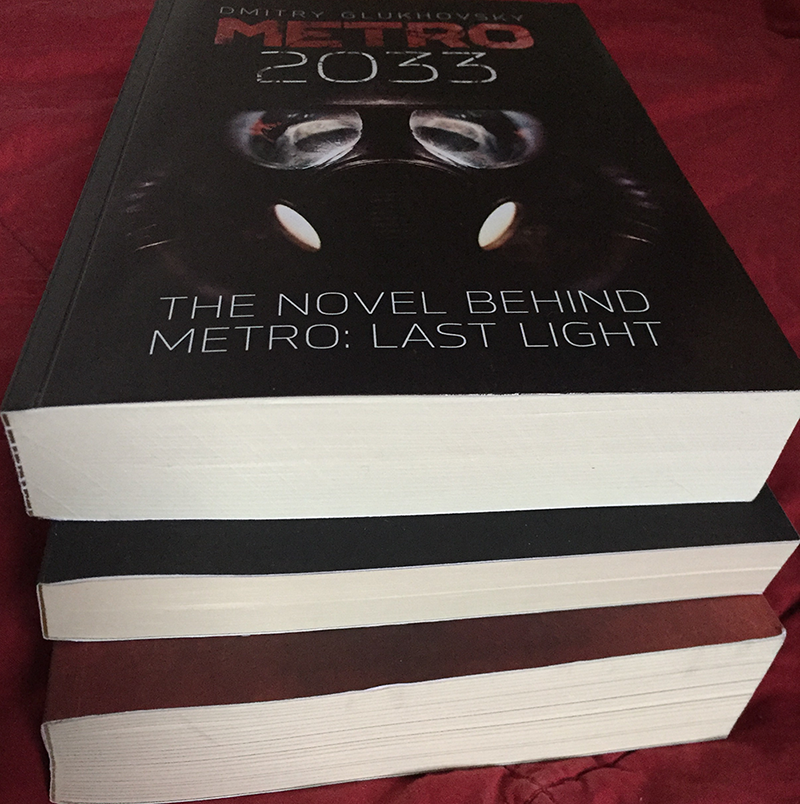
These books are not short. My edition of Metro 2033 clocks in at 460 pages; Metro 2034 runs 283 pages; Metro 2035 is a whopping 496 pages. A professional editor would, no doubt, carve out a lot of the characters and scenes, for reasons of time and space. But I’m glad they got to stay intact in the author’s vision. The books would definitely feel lesser for their loss.
Inspiration from Metro 2033
I’ve always enjoyed speculative and science fiction, though most of my long-standing favorites are farther flung in time than the world of Metro 2033. And, much of my pleasure reading over the last few years has centered firmly around detective fiction. But I had a great time reading these books; I’m glad that the recent bundle sale of the games prompted me to look up the story that inspired them, and I’m grateful to have read a young author’s journey through a world of his own making.
Glukhovsky published the first book online, on his personal website, for free. No editor, no publisher; the book distribution came three years later, after it had already been read by thousands of people in Russia and overseas. It gives me hope that there are still people – “regular” readers – who are willing to take a chance on something new, something different, something personal that doesn’t necessarily have the stamp of a big-name publishing company on it. Hope for me as a writer…and for me as a person in the real world who doesn’t want to live someplace like the Metro.
If any of you have read these books, let me know! I’m dying to talk about them with somebody. 🙂
by Mayumi-H | Dec 8, 2012 | Uncategorized
Before NaNoWriMo hit me over the head with its massive mallet, I was nominated for the Booker Award, by the lovely itsjennythewren. (Sorry it’s taken me so long to acknowledge!)
 That description fits me well! 😀
That description fits me well! 😀
For the Booker Award, I’m to list my top five favorite books, and nominate five other bloggers.
I don’t like nominating other bloggers, because there are so many talented writers I follow out there, and I always feel bad when I’ve missed someone. So, rather than make nominations, take a stroll through the Friends of my blog or the list of bloggers I follow, and give their sites a read. And, feel free to join the ranks of the Booker Award winners by taking the image above!
Now, for my favorite books….
This list fluctuates a lot from year to year, based on what I’m reading (and what world I’m embroiled in). But, here are some of my perennial favorites (links lead to the Wikipedia pages, which do contain spoilers, so be warned):
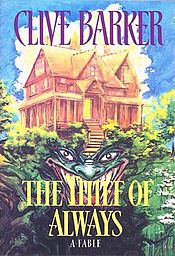 The Thief of Always, by Clive Barker.
The Thief of Always, by Clive Barker.
A fable of magic, childhood, and the preciousness of time. Written for children, this quick read is also a story for adults, as it recaptures much of what’s fantastic about being a child. There’s danger and wit, even a charmingly chaste love story. And, of course, an unlikely hero who’s every bit magician as he is simple boy.
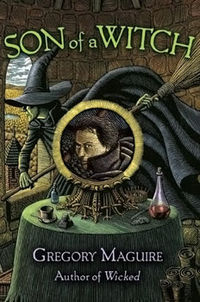 Son of a Witch, by Gregory Maguire.
Son of a Witch, by Gregory Maguire.
The sequel to Maguire’s popular retelling of the Oz stories, Wicked. I liked Wicked a lot, but I appreciated the more direct coming-of-age tale central to Son. Full of dragons, intrigue, and romance (of many kinds), Son of a Witch feels more complete, to me. It suffers a bit from being a middle book, but there’s enough about Liir – the main character – to make the world of Oz feel so much more real than it did even in Wicked.
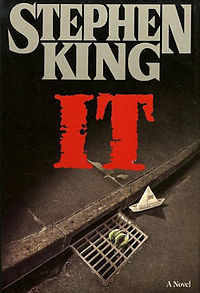 IT, by Stephen King.
IT, by Stephen King.
There’s something about terror and childhood going hand-in-hand, and King’s IT does so masterfully. Many of us can relate to at least one of the Losers, the children-become-adult protagonists in the book. The main conflict between monster and men (and woman) is terrifying and thrilling…but King’s prose feels strongest when he’s telling the history of the Losers’ lives in rural Maine. I’ve heard the book touted as a great American horror story, but it is, at its core, about characters. And those characters cut, bleed, shine, love, and everything in between.
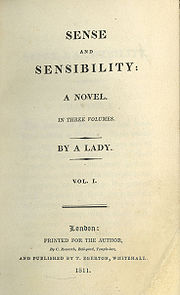 Sense and Sensibility, by Jane Austen.
Sense and Sensibility, by Jane Austen.
Like my Sally says, “[That] is one of my favourite stories!” The romantic and dramatic entanglements of the Dashwood sisters are timeless, and their wit and sensitivity are equally biting and tender. Colonel Brandon is one of those great soft-spoken heroes (yes, I call him a hero) you look for in real life. The story is a bit pat for some modern readers, but I’ve always enjoyed its distinctly feminine charms.
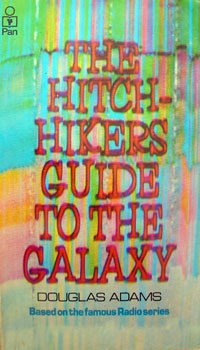
The Hitchhiker’s Guide to the Galaxy, by Douglas Adams.
Really, who can’t identify with common-man shlub Arthur Dent, and the (mis-)adventures he has with Ford Prefect, Zaphod Beeblebrox, and Trillian? While the story didn’t start as a novel, Adams’s sometimes-caustic but always-entertaining humor – both in the story proper and the side-notes for the Guide – is one-of-a-kind, and firmly entrenches this book in my list of favorites. The sequels are darn good, too, but this introductory adventure of mice and questions and the destruction of the Earth is a wonderful romp on so many levels. If you haven’t read the Guide, I don’t know what you’re waiting for.
Additional:
“The Unholy Grail,” by Fritz Leiber.
This one is not a book but a novelette, the first story ever written about the sword-and-sorcery anti-hero, the Gray Mouser. Companion Fafhrd doesn’t even show up in this story except as a single line anecdote, but that doesn’t stop this one from being one of my favorite Fafhrd and Gray Mouser stories, ever, mostly for how visceral Mouse’s hatred is for the villain, and how overflowing his love for the villain’s daughter, Ivrian. Fafhrd and the Mouser are notorious womanizers, but, in this short tale, you really get a sense for who Mouse could have been, if he hadn’t succumbed to the allure of dark magic. Ivrian is a great little character, too: frail at the beginning but with a kind of growing strength the more time she spends with her beloved Mouse. Just a great fantasy read, simple in its telling, and I look to this one whenever I think I’m going overboard with the prose.
———
Thanks again to itsjennythewren for the nomination! It was a great excuse for me to comb through my bookshelves, again.
What are your favorite stories?










Recent Comments
The Real Person!
Author Mayumi-H acts as a real person and passed all tests against spambots. Anti-Spam by CleanTalk.
The Real Person!
Author Mayumi-H acts as a real person and passed all tests against spambots. Anti-Spam by CleanTalk.